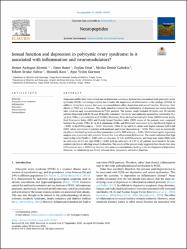Sexual function and depression in polycystic ovary syndrome: Is it associated with inflammation and neuromodulators?

Göster/
Erişim
info:eu-repo/semantics/openAccessTarih
2020Yazar
Aydoğan Kırmızı, DemetBaşer, Emre
Onat, Taylan
Demir Çaltekin, Melike
Yalvaç, Ethem Serdar
Kara, Mustafa
Göçmen, Ayşe Yeşim
Üst veri
Tüm öğe kaydını gösterKünye
Kirmizi, D. A., Baser, E., Onat, T., Caltekin, M. D., Yalvac, E. S., Kara, M., & Gocmen, A. Y. (2020). Sexual function and depression in polycystic ovary syndrome: Is it associated with inflammation and neuromodulators?. Neuropeptides, 84, 102099.Özet
Numerous studies have been carried out on depression and sexual dysfunction concomitant with polycystic ovary syndrome (PCOS). Increasing evidence has revealed the importance of inflammation in the etiology of PCOS. In addition, it has been known that some neuromodulators affect depression and sexual function. However, their effects on PCOS are not known. This study aimed to evaluate the relationship of depression and sexual function with cytokines and neuromodulators in PCOS patients. The present study included 20 fertile and 30 infertile patients diagnosed with PCOS and 30 healthy volunteers. Metabolic and endocrine parameters, interleukin (IL)-1β, IL-6, TNFα, γ-aminobutyric acid (GABA), Glutamate, Brain-derived neurotrophic factor (BDNF) serum levels, Beck Depression Index (BDI) and Female Sexual Function Index (FSFI) scores of the patients were compared between the groups. TNFα, IL-1β, IL-6, glutamate, GABA, and BDI scores were found to be significantly higher (p < 0.05) in the PCOS group (p < 0.05). Glutamate, TNFα, IL-1β, and IL-6 values were higher whereas GABA and BDNF values were lower in pateints with moderate and severe depression (p < 0.05). There were no statistically significant relationships between these parameters and the FSFI scores (p > 0.05). Multivariate logistic regression analysis was conducted with potential factors that may affect sexual dysfunction. The results indicated that high waist-to-hip ratio (WHR) (> 0.80) with an odds ratio of 1.81 in PCOS patients, and body mass index (BMI) with an odds ratio of 2.3 and high WHR (> 0.80) with an odds ratio of 1.97 in all patients were found to be independent risk factors affecting sexual dysfunction. The results of the present study suggested that chronic low-dose inflammation seen in PCOS may interact with some neuromodulators, leading to the development of depression. However, no relationship was found between these parameters and sexual function. © 2020 Elsevier Ltd

















